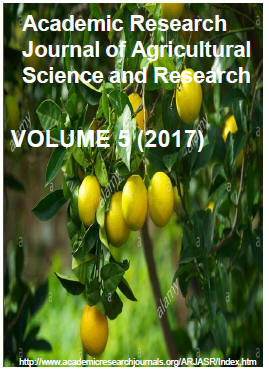| ARJASR |
Academic Research Journal of
Agricultural Science and Research |
||||||||||||||||||||||
|
Academic Research Journal of Agricultural Science and Research Vol. 5(5), pp. 358-365. September, 2017. ISSN: 2360-7874 DOI: 10.14662/ARJASR2017.042 Full Length Research Effect of Deficit Irrigation at Different Growth Stages on Onion (Allium Cepa L.) Production and Water Productivity at Melkassa, Central Rift Valley of Ethiopia
Gobena Dirirsa1*, Abraham Woldemichael2 and Tilahun Hordofa1
1Melkassa Agricultural Research Center, P.O.Box 436, Adama, Ethiopia; 2Hawassa University, P.O.Box 05, Hawassa, Ethiopia. *Corresponding author's email: dirirsagobe@gmail.com Accepted 14 August 2017
Improving
water use efficiency is one important strategy for addressing future
water scarcity, which is driven particularly by increasing human
population. Enhancing agricultural water productivity is a critical
response as it is by far the main consumer of global fresh water. A
field experiment was conducted at Melkassa Agricultural Research Center
during the off-rain season to investigate the sensitivity of onion (Nafis
variety) yield and water productivity to deficit irrigation at different
growth stages. The experiment was carried out in randomized complete
block design with fifteen treatments and three replications. The
treatments were set as: one stage deficit of 25% and 50% at development
and mid growth stages; two stage deficits of 25% and 50% at two
consecutive stages from initial to maturity; three stage deficits of 25%
and 50% at three stages with either development or mid stage in a
combination; and control. Crop water use was estimated using soil
moisture depletion method. The result showed that the different deficit
irrigation had significant (p< 0.01) impact on bulb yield. The control
treatment gave the highest bulb yield of 40.38 t/ha with no significant
difference from 25% deficit treatments except the deficit at bulb
formation stage. Crop water productivity (kg/m3) was the highest with no
deficit irrigation at the bulb formation stage with 25% deficit at other
stages, and the yield response factor (Ky) was higher when half deficit
occurred at same stage. The result revealed that onion bulb yield was
most sensitive to water deficit that occurred at bulb formation stage.
This result can guide irrigation scheduling to achieve optimal onion
bulb production under water scarce condition.
How to cite this article: Dirirsa G, Woldemichael A, Hordofa T (2017). Effect of Deficit Irrigation at Different Growth Stages on Onion (Allium Cepa L.) Production and Water Productivity at Melkassa, Central Rift Valley of Ethiopia. Acad. Res. J. Agri. Sci. Res. 5(5): 358-365
|
|
|||||||||||||||||||||
